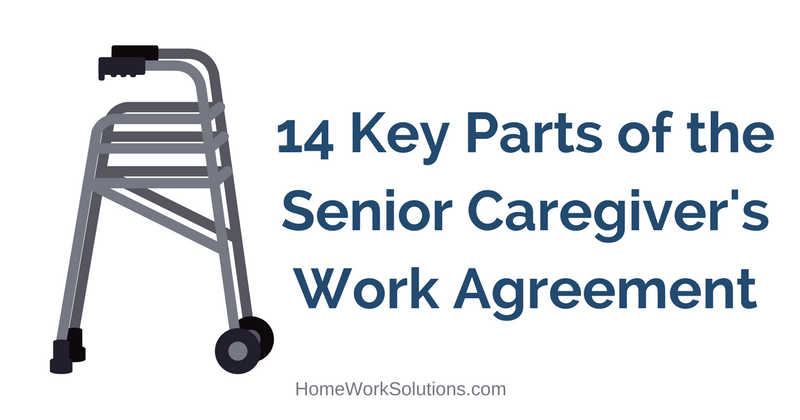
Many families that hire a senior or elder caregiver to care for a loved one want to document the arrangement so that all parties - the senior caregiver, the supervising family member, other family members and the senior receiving the care - all understand the terms and scope of the employment agreement. This is a best practice at all times! You will want this document to restate the terms of employment, including hours and wages, and to memoralize the items you originally agreed upon with the caregiver. So what do you need to include in this senior caregiver work agreement?
- The name, address and Social Security Number of the caregiver (you need this for payroll tax reporting later) and the name and address of the employer. The employer will be the financially responsible party, either the senior receiving the care if his/her funds are used, or the responsible relative if they are funding the care.
- The days and hours the caregiver is scheduled to work.
- The compensation agreement, to include an hourly pay rate, the frequency of payroll (weekly or biweekly are most common), and a guaranteed weekly base if applicable.
- Payroll tax agreement. You must at a minimum report and pay to the Internal Revenue Service the Social Security and Medicare taxes (FICA taxes). You will either deduct the caregiver's portion from their pay or agree to pay it in addition to their hourly pay. Make sure you are clear in the agreement on how you are handling this. You may choose to deduct income taxes, or state that the caregiver will pay their own income taxes.
- Paid time off, to include vacation time, sick time, and what holidays are paid. In most areas this is not legally required but it is commonly expected, especially with full time caregivers.
- Your policy for notice of unplanned absences and an inclement weather policy.
- A termination agreement, including notice or pay in lieu of notice agreement.
- Specific duties and responsibilities.
- Expense reimbursement - typically mileage reimbursement if the caregiver uses their personal vehicle to drive the senior to appointments or shopping, or reimbursement for incidentals such as groceries. You can and should require detailed receipts and documentation.
- House rules, including household security, approved use of household property such as wifi or computers, social media policy (you may wish to restrict the caregiver from posting photos or details about whom they work for or where).
- Prohibitions (Smoking, alcohol, off limits areas in the home, abusive language or behavior, theft, not calling ahead if unavailable, eating your food, parts of the house that are off limits, etc.)
- Emergency procedures - who to contact, how and in what order.
- A confidentiality agreement.
- A return of family property agreement - this may be household keys, remote door openers, or a walker or wheel chair the caregiver keeps in the trunk of their car.
Details matter - don't be afraid of including too much. Aging in place has many rewards, but planning ahead is crucial. Both the caregiver and the employer should sign the senior care work agreement, and a minimum of two copies made, one for the caregiver and one for the employer. Additional copies may be wise if you want the agreement to be clear to other family members.
Other Resources:
- Frequently Asked Questions: Elder care/Senior Caregiver Payroll Taxes
- Household Employee Payroll Calculator & Budget Tool
- Household Employee Pre-employment Background Checking

